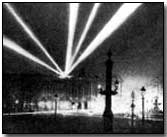On This Day - 18 April 1918
 Theatre definitions:
Western Front comprises the Franco-German-Belgian front and any
military action in Great Britain, Switzerland, Scandinavia and Holland.
Eastern Front comprises the German-Russian, Austro-Russian and
Austro-Romanian fronts. Southern Front comprises the
Austro-Italian and Balkan (including Bulgaro-Romanian) fronts, and
Dardanelles. Asiatic and Egyptian Theatres comprises
Egypt, Tripoli, the Sudan, Asia Minor (including Transcaucasia), Arabia,
Mesopotamia, Syria, Persia, Afghanistan, Turkestan, China, India, etc.
Naval and Overseas Operations comprises operations on the seas
(except where carried out in combination with troops on land) and in
Colonial and Overseas theatres, America, etc. Political, etc.
comprises political and internal events in all countries, including Notes,
speeches, diplomatic, financial, economic and domestic matters.
Source: Chronology of the War (1914-18, London; copyright expired)
Theatre definitions:
Western Front comprises the Franco-German-Belgian front and any
military action in Great Britain, Switzerland, Scandinavia and Holland.
Eastern Front comprises the German-Russian, Austro-Russian and
Austro-Romanian fronts. Southern Front comprises the
Austro-Italian and Balkan (including Bulgaro-Romanian) fronts, and
Dardanelles. Asiatic and Egyptian Theatres comprises
Egypt, Tripoli, the Sudan, Asia Minor (including Transcaucasia), Arabia,
Mesopotamia, Syria, Persia, Afghanistan, Turkestan, China, India, etc.
Naval and Overseas Operations comprises operations on the seas
(except where carried out in combination with troops on land) and in
Colonial and Overseas theatres, America, etc. Political, etc.
comprises political and internal events in all countries, including Notes,
speeches, diplomatic, financial, economic and domestic matters.
Source: Chronology of the War (1914-18, London; copyright expired)
Western Front
Heavy attacks from Givenchy to Lys river. Fighting particularly severe at Givenchy, where enemy make slight advance.
In the north, attacks south of Kemmel repulsed.
French progress on Avre river and take 650 prisoners at Castel.
Belgians repulse attack north-west of Passchendaele.
Southern Front
Macedonia: Enemy detachments attack Italians in Cherna Bend and are repulsed.
Naval and Overseas Operations
Enemy destroyers bombard Adinkerke (Belgian coast).
Political, etc.
Military Service Bill (Manpower) receives Royal Assent.
Lt.-Gen. Sir D. Henderson resigns from Air Board.
Dublin Mansion House Conference, after consultation with Bishops, denies right of Government to enforce conscription.
Cape Town: In House of Assembly, Sir P. Fitzpatrick denounces Mr. Hertzog for sedition.
Early of Deby appointed Ambassador to France, vice Lord Bertie.
Mr. A. Chamberlain joins War Cabinet.
Viscount Milner to be Secretary of State for War.
